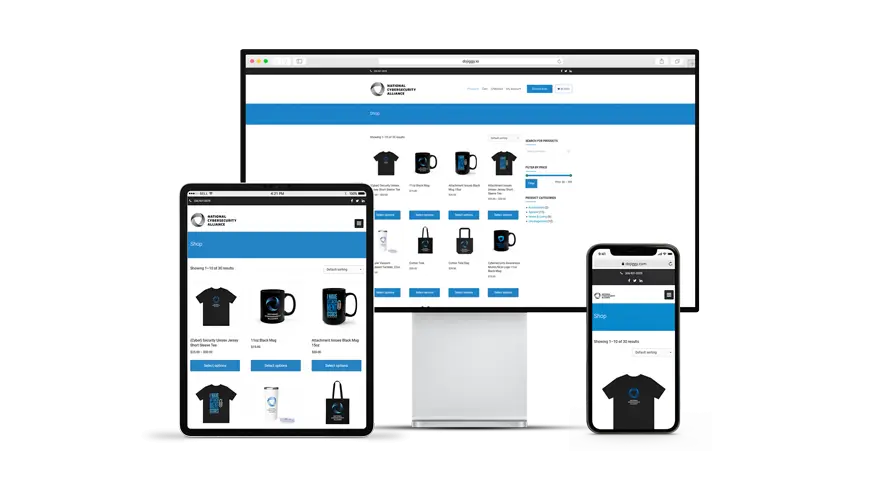
While nonprofit fundraising traditionally comes from donations, grants, and proceeds from fundraising events, many groups have another easy option: creating an online store for their nonprofit.
Nonprofit merchandise sales also help build your nonprofit brand. When your supporters wear or carry merchandise that displays your logo, it helps spread awareness about your nonprofit mission. Brand awareness is one of the essential steps toward building a nonprofit brand.
So read on to discover the essential steps for nonprofit merchandise sales and how to build a nonprofit eCommerce store.

Here’s What We’ll Cover
- Can Nonprofits and Churches Sell Merchandise?
- Step 1: Decide on the Best Products for Your Organization’s Store
- Step 2: Evaluate Shipping Logistics
- Step 3: Determine Product Pricing
- Step 4: Use Great Product Photos
- Step 5: Add Donation Functionality
- Step 6: Add an Option to Engage More During Check-Out
- Step 7: Build Your SEO Strategy
- Step 8: Promote Awareness of Your Online Store and Products Through Social Media
Can Nonprofits and Churches Sell Merchandise?
Let’s start at the beginning. Some organizations ask if nonprofits or churches can legally sell merchandise. Luckily, the short answer is yes! These organizations can absolutely sell products to generate revenue in support of their mission. There are specific laws and regulations that these groups need to review and follow to do so, but the benefits of product sales can undoubtedly be worth it.
Step 1: Decide on the Best Products for Your Organization’s Store

Once you decide to sell items for your organization, the first step is determining the best products for your supporters and audience. Talk to co-workers and friends and view other organizations’ online stores for ideas. Be creative and find items that match your organization’s mission and values. For example, animal shelters can successfully sell customized pet products like doggie sweaters, leashes, and collars.
Some of the most popular products for nonprofit merchandise sales include:
- Branded t-shirts
- Sweatshirts and sweaters
- Hats and caps
- Key chains
- Bracelets and jewelry
- Tote bags, laptop cases, or backpacks
- Phone protectors and cases
- Notebooks
- Coffee mugs – stainless steel and ceramic
Read more ideas on the best custom-printed merchandise for nonprofits.
Step 2: Evaluate Shipping Logistics

Shipping logistics is an important factor to consider when choosing which products to host in your online store. Consider whether these products will be drop-shipped from a company that can make items on demand or stored on-premise and shipped by your staff.
Our eCommerce stores integrate with Printify and Printful, for easy on-demand printing and shipping.
Vet vendors for manufacturing terms, turnaround time, minimum requirements, and other terms or fees associated with ordering products. Another consideration is where the items are manufactured, whether they are made domestically or internationally and whether this is a priority for your organization and supporters.
Step 3: Determine Product Pricing

After evaluating the full cost of selling products, price each product appropriately. You will generally want to make a profit of approximately 30-50% for each item. With lower-cost items such as key chains, the profit margin can be as high as 75%. Keep track of this information so that you can offer sales and promotions while still raising money. Perform market research on other nonprofit organizations to ensure that your merchandise isn’t priced too high or too low while still determining the amount needed to make a reasonable profit.
Printful’s pricing app makes it easy to see your nonprofit price and how much your organization will earn on each sale.
Step 4: Use Great Product Photos

The appeal of purchasing nonprofit merchandise (like in retail) begins with attractive photos and visuals. Make sure to show your merchandise in the best light. Have photos of your merchandise professionally edited so the storefront looks professional.
Our online stores for nonprofits allow you to add as many images as you need for each product. You can have a single image of an item or multiple images showing different views of an item. Add variations of one type of product, such as baseball caps. You can have a separate image and price for each variation of that product. Users can easily scroll through images to view different angles or attributes.
Step 5: Add Donation Functionality

Always offer online and mobile giving options within the storefront. This can be done as a Donate Now button or by integrating an option to donate during check-out if a supporter wants to give a little extra during their transaction.
Our Pro store supports recurring giving for monthly nonprofit donations. (Starting a monthly donation campaign is a great additional revenue source for nonprofits to consider.)
Step 6: Add an Option to Engage More During Check-Out

Customers of your nonprofit merchandise sales may not necessarily be subscribed to receive updates about your nonprofit organization. Offer a checkbox to add them to your newsletter subscription and event invitations. This is an opportunity to cultivate donors to participate in other great ways, whether volunteering, attending future events, or becoming a recurring donor.
As always, offering a great donor experience is critical. Don’t forget that customer service should be friendly and responsive after the sale, whether offering an interactive prompt to answer questions for storefront visitors, a toll-free number to handle order inquiries, or a customer service email.
Pro Tip: Integrate your online store with a nonprofit CRM to maximize user data.
Offer a Great Shopping Experience with Our E-commerce Stores

Make sure your online storefront is easy for your supporters to navigate. DoJiggy online store websites offer easy-to-use templates that are customizable for your nonprofit’s needs. We offer two types of nonprofit stores.
E-commerce Store Option 1: Simple Stores
Our Simple Stores are the best option to get your organization set up and selling quickly, with little effort. Users can set up the store for free and add items within minutes. This is an excellent option for schools, churches, clubs, and all organizations where items can be picked up on-site. It also works well with fundraising events and sales fundraising campaigns. Shipping can be done if you build the shipping cost into the product cost or apply a flat fee to each transaction for shipping.

Another great feature of our Simple Stores is that individuals and teams can sell for your organization by enabling peer-to-peer functionality for your store.
Features of our Simple Stores include:
- Free pricing model, pay only a percentage of sales
- Sales tax can be added to items
- Administer promo codes for discounted sales
- Fundraising thermometer tracks sales progress
- Promote your fundraising sales via our free Text to Give feature
- Secure payment processing by Stripe
E-commerce Store Option 2: Pro Stores
Our Pro Stores are for organizations that need more functionality, including automated printing and fulfillment by Printful and Printify. Many organizations use the Pro Store as part of their website as an ongoing revenue generator. The Pro store is also great for organizations that don’t mind paying a monthly fee and want low platform fees.
Features of our Pro Stores include:
- Shipping connects to the USPS app for real-time shipping rates
- Automated printing and fulfillment of items with Printify integration
- Payment processing via Stripe, Authorize.net, or PayPal
Request a Free Trial See a Pro Store Demo
Step 7: Build Your SEO Strategy

Robust nonprofit websites strategically integrate SEO (search engine optimization) into their strategy. SEO is a marketing approach that involves researching keywords and incorporating these keywords into the copywriting of blogs and web pages. Your nonprofit merchandise website should be no exception. When a user is searching for nonprofit merchandise or nonprofit stores, you want Google to find your organization.
Yoast, the leading SEO app for WordPress-based nonprofit websites, is built into our Pro store website builder. Utilizing SEO tools and best practices is essential to search engine rankings.
Step 8: Promote Awareness of Your Online Store and Products Through Social Media

In addition to having a robust nonprofit SEO strategy, incorporating merchandise promotion into your social media marketing is critical. Here, you can post photos of supporters and staff wearing your nonprofit merchandise casually or at nonprofit events. Whether donning a cap or hoodie or carrying a tote bag, building brand awareness is one of the benefits of nonprofit merchandise sales. Social media is the perfect vehicle to promote your nonprofit’s brand while having fun. Photos with supporters using the merchandise can be promoted with a hashtag so that they are easy to find on popular social media platforms, such as Facebook, Instagram, or Twitter. Offer specials and discounts for supporters here, and your sales are sure to grow.
Don’t Forget to Review the Legal Parameters of Selling Merchandise for a Nonprofit

For the most part, nonprofit organizations that sell products supporting their mission should have no problem as long as the proceeds from such sales are categorized appropriately when filing taxes. However, these plans should be discussed with the nonprofit accountant or CFO to ensure that the storefront operates according to 501(c)3 standards.
Conclusions on Nonprofit Merchandise Sales
Following these steps, getting your organization set up with an online store for nonprofits will be simple. Set a deadline and plan accordingly so your storefront launch and merchandise sales will run seamlessly. DoJiggy can help simplify setting up your storefront for nonprofit merchandise sales by providing an easy-to-customize storefront that is perfect for nonprofit organizations.
Still Looking for Fundraising Ideas?
![What Are the 5 Ps of Event Planning? [The 5 P Event Framework] What Are the 5 Ps of Event Planning? [The 5 P Event Framework]](https://www.dojiggy.com/files/sites/164/2024/02/event-planning-344x282.webp)


